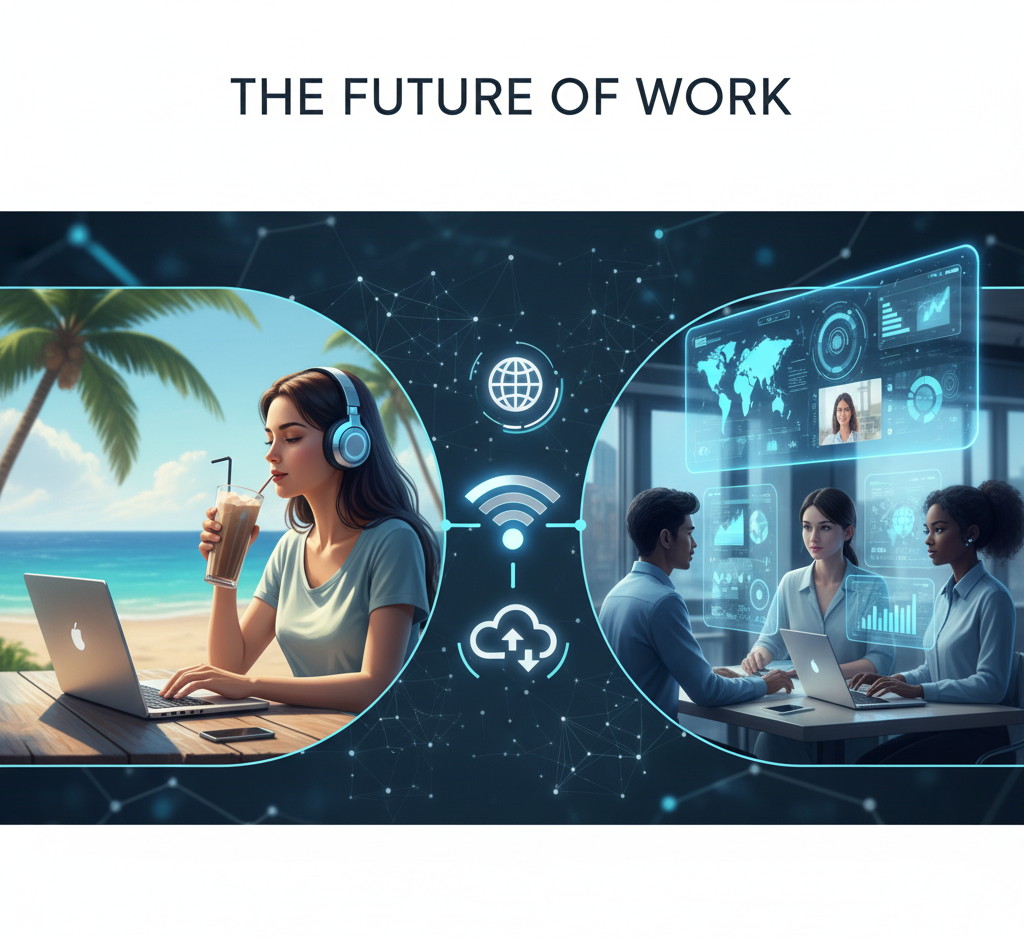The idea of spending eight hours a day in a cubicle is quickly becoming a relic of the past. The traditional office, once the cornerstone of professional life, is losing its dominance as new, more flexible ways of working take hold. Advances in technology, globalizationtion, and shifting employee priorities have led to a reimagining of what “work” truly means.Employees today value autonomy, purpose, and balance more than ever before. Rather than being tied to one location, professionals are embracing opportunities that allow them to work from anywhere, whether that’s a cozy home office, a café, or a beach halfway across the world.This evolution has given rise to two defining models of modern future of employment: freelancing and remote work. Both are transforming the global economy, reshaping how businesses operate and how workers define success.
Freelancing vs. Remote Work: What’s the Real Difference?
While freelancing and remote work may appear similar on the surface, they represent two distinct approaches to employment.
Freelancing is based on independence. Freelancers are self-employed professionals who take on projects for multiple clients. They manage their own schedules, negotiate rates, and handle everything from contracts to taxes. The flexibility is unmatched, freelancers can choose projects that align with their skills and passions.
Remote work, by contrast, involves being employed by a company but working outside of a traditional office environment. Remote workers often enjoy the stability of a salary, access to benefits, and the sense of belonging that comes from being part of a team.
The main distinction lies in control and structure. Freelancers have full autonomy but face uncertainty in income and workload. Remote workers have more security but less control over their assignments and schedules. Both models cater to different lifestyles and both are here to stay.

How Did We Get Here and What Sparked the Shift?
The shift toward flexible work didn’t happen overnight. It’s the result of years of technological advancement and a changing mindset about what constitutes productivity.
High-speed internet, cloud computing, and collaboration tools like Zoom, Slack, and Google Workspace made it possible to work efficiently from anywhere. Then came the COVID-19 pandemic, which accelerated the adoption of remote work worldwide. Companies that once resisted flexibility were suddenly forced to adapt and they discovered that work-from-home arrangements could actually boost productivity and morale.
At the same time, the gig economy began to thrive. Platforms such as Upwork, Fiverr, and Wiraa allowed professionals to find freelance opportunities globally. People realized they didn’t need a single employer to build a stable career; they could carve out their own paths, balancing multiple projects and clients.
Together, these changes dismantled the idea that work must happen in a fixed place and time. Instead, success is now measured by results not by how many hours you sit at a desk.
Can Companies Really Thrive Without Traditional Teams?
One of the biggest concerns about remote work and freelancing is whether companies can remain productive without physical offices and in-person teams. The answer, increasingly, is yes.
Organizations that embrace distributed teams often report higher employee satisfaction and reduced overhead costs. Digital collaboration tools make communication seamless, while project management platforms like Asana and Trello keep everyone on track.
Moreover, hiring remote workers and freelancers allows companies to access global talent. Businesses can find the best people for the job, regardless of location. This diversity of skills and perspectives often leads to more creativity and innovation.
However, thriving in this new environment requires intentional effort. Companies must foster digital culture, prioritize communication, and build trust. When done right, flexible work structures can be even more effective than traditional ones.
The Skills That Will Define Tomorrow’s Workforce
As freelancing and remote work reshape the future of employment landscape, certain skills are becoming more valuable than ever. Future professionals will need a mix of technical expertise and soft skills to succeed.
Key skills include:
- Digital literacy: Comfort with online tools, automation, and AI-powered systems.
- Self-management: The ability to stay organized, motivated, and accountable without constant supervision.
- Communication: Strong written and verbal communication for effective collaboration in virtual environments.
- Adaptability: Openness to change and continuous learning in a rapidly evolving digital world.
- Entrepreneurial mindset: Freelancers and remote workers alike must think strategically about personal growth and value creation.
These skills will not only define individual success but also determine how competitive companies remain in the digital economy.
Are Hybrid Careers the Future of Professional Life?
The future of employment may not be about choosing between freelancing or remote work, but combining both. Many professionals now hold full-time remote roles while freelancing on the side diversifying income and skills.
This hybrid model offers the best of both worlds: the financial security of a stable job and the creative freedom of independent work. It also gives companies access to flexible talent without long-term commitments, creating win-win scenarios for both sides.
Platforms like Wiraa make this transition easier by connecting professionals with global remote and freelance opportunities. Through Wiraa, individuals can explore flexible careers while organizations find specialized talent on demand.
As the boundaries between freelancing and remote work blur, hybrid careers are emerging as the defining trend of the next decade where adaptability, technology, and creativity intersect.
Conclusion
Freelancing and remote work are no longer fringe ideas they are the foundations of the modern workforce. The traditional office model is fading, replaced by digital-first structures that value productivity, balance, and choice.
The future of employment lies in flexibility the freedom to choose how, when, and where we work. Whether you pursue freelancing, remote work, or a combination of both, success will depend on your ability to adapt, learn, and stay connected in a global, tech-driven world.
Platforms like Wiraa are empowering this transformation by bridging opportunities between businesses and professionals everywhere. As the boundaries of work continue to evolve, one thing is clear: the future belongs to those who embrace change and shape their own paths.




